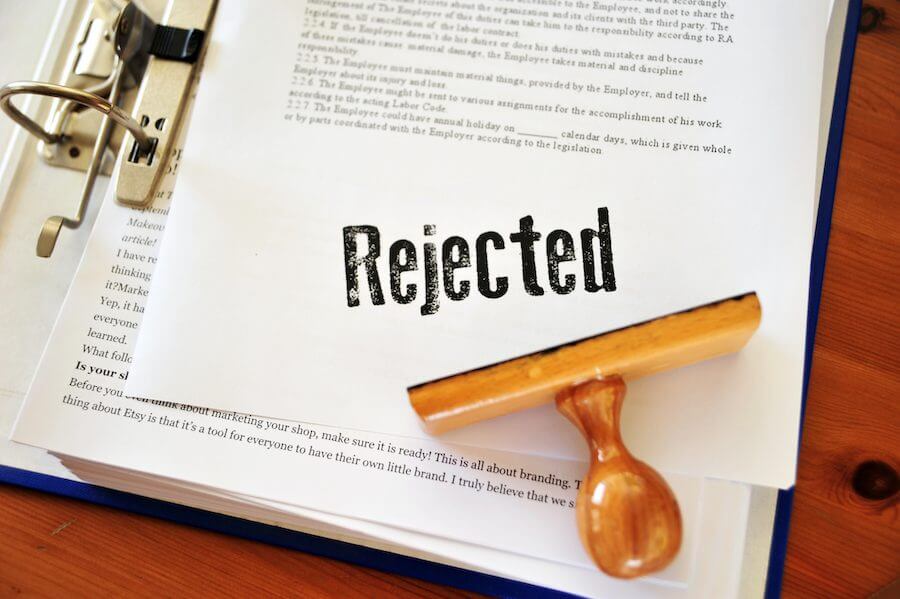A job rejection letter is a letter written to job applicants letting them know that they have not been selected for the position.
It is commonly written by the hiring manager or HR. The number of job applicants will normally be high, meaning there will always be applicants who do not make it to the next step of the selection process. It is easier to dismiss a person’s application, especially if they are not good for the job. However, this should not be an option, and the reason is that applicants take time to craft their resume, apply, and interview for a position. It is only right to reciprocate the effort, even if they do not qualify. This letter formally and respectfully declines a job application, allowing the applicant to continue their job search rather than waiting for an acceptance letter that will never come.
Job applicants that are typically issued rejection letters are:
- Job applicants were not selected for the interview stage.
- Applicants who were able to make it past one phase of the selection or hiring process.
- Second and third choice applicants.
Not sending a job rejection letter can paint a negative picture of the company’s brand and hiring process.
Free Templates and Samples
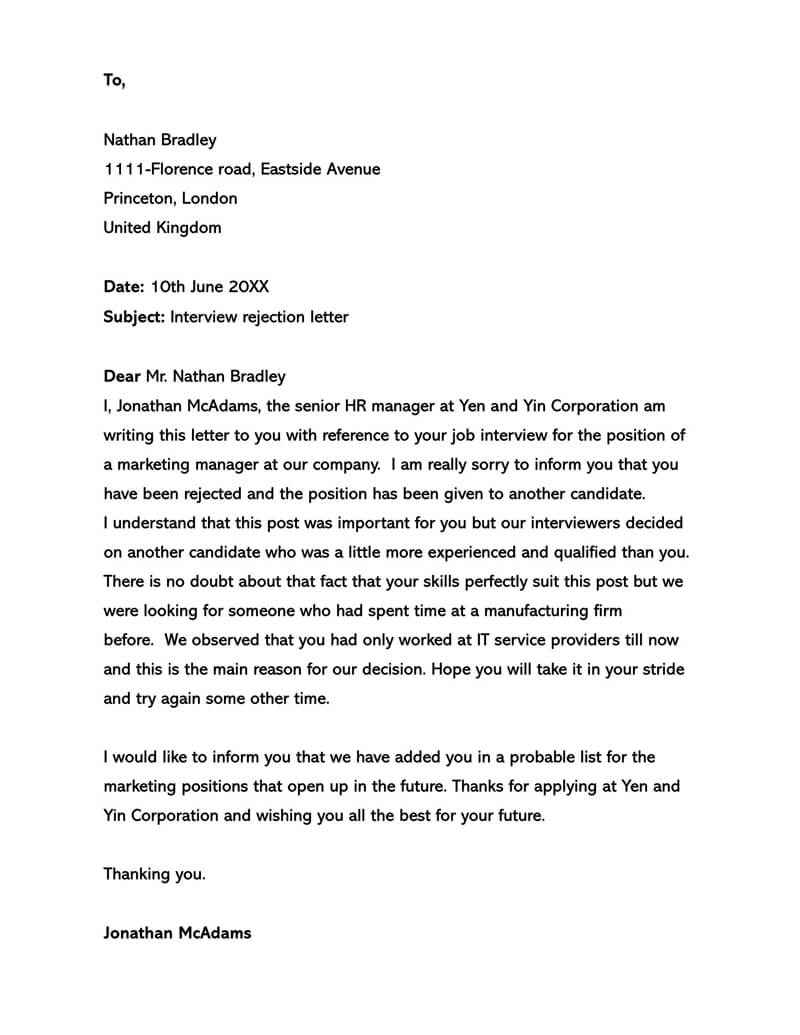
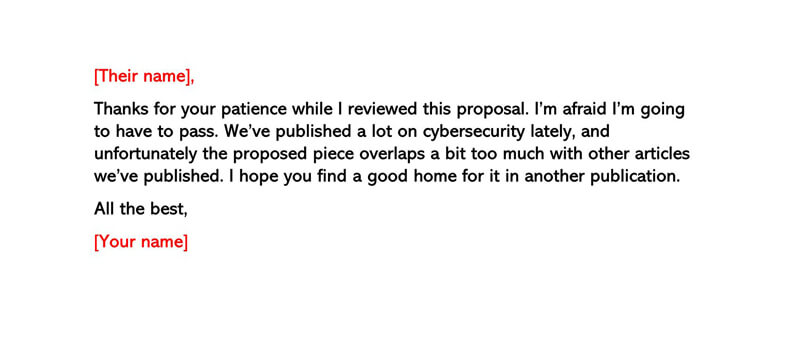
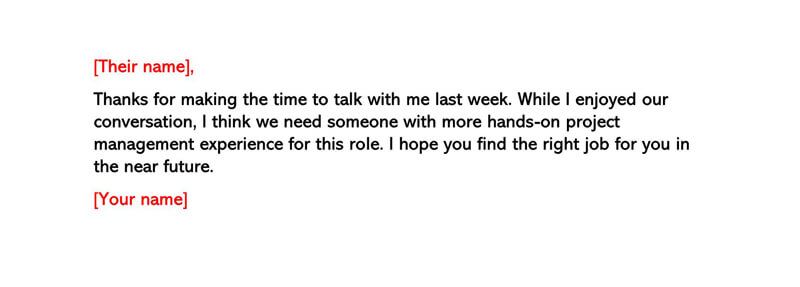
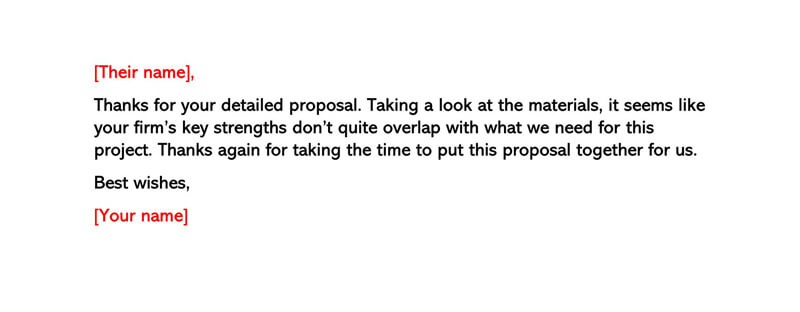
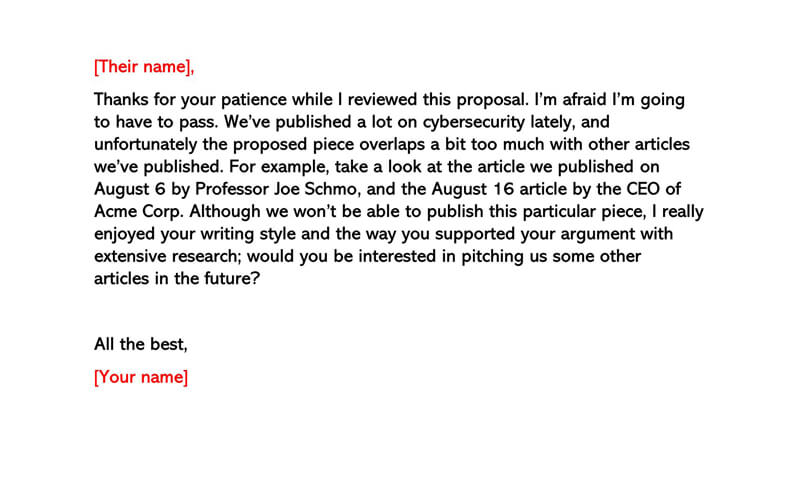

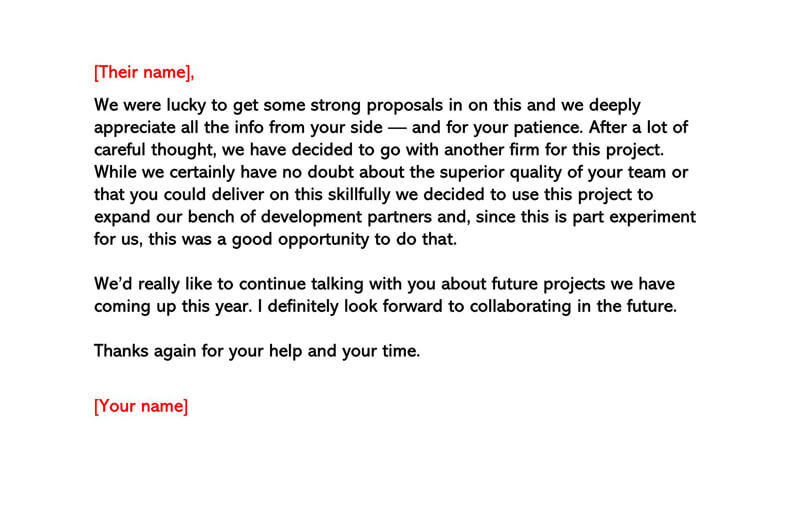
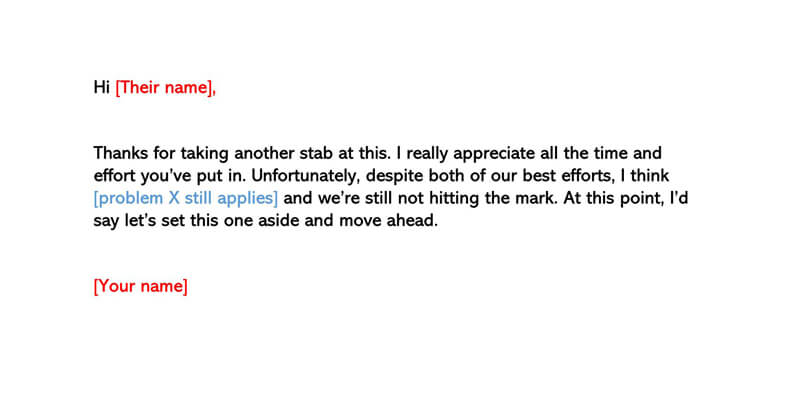
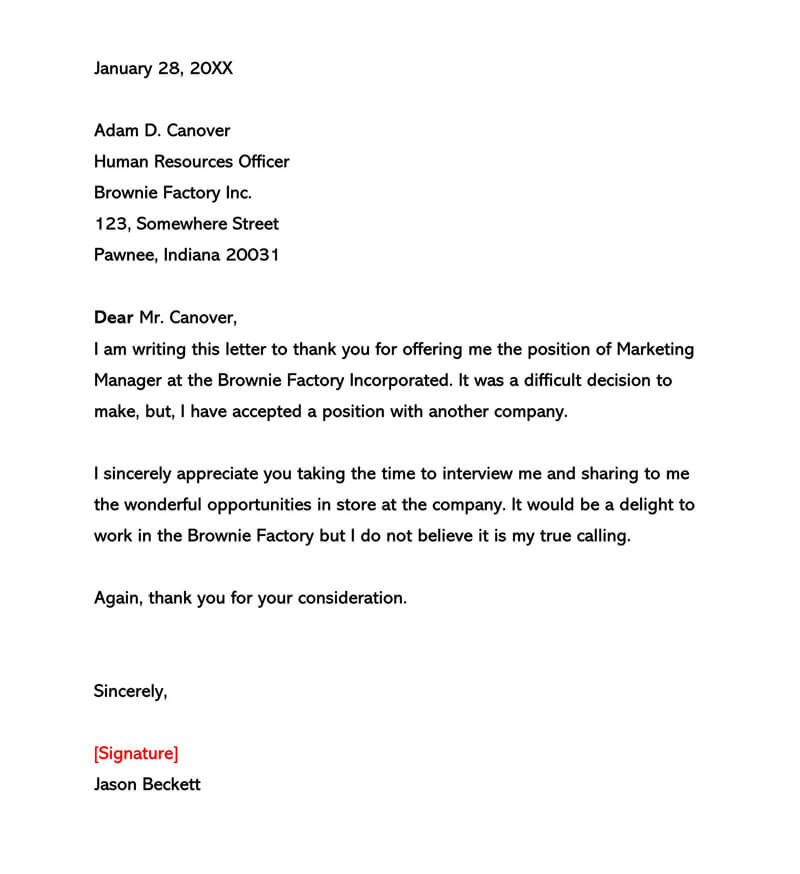
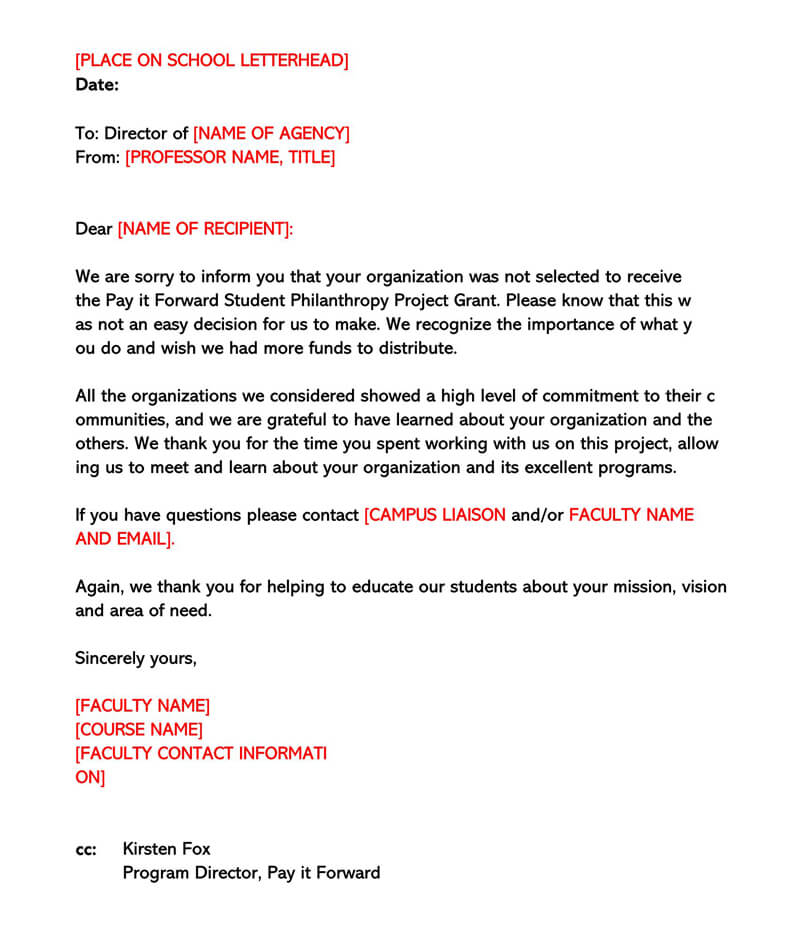
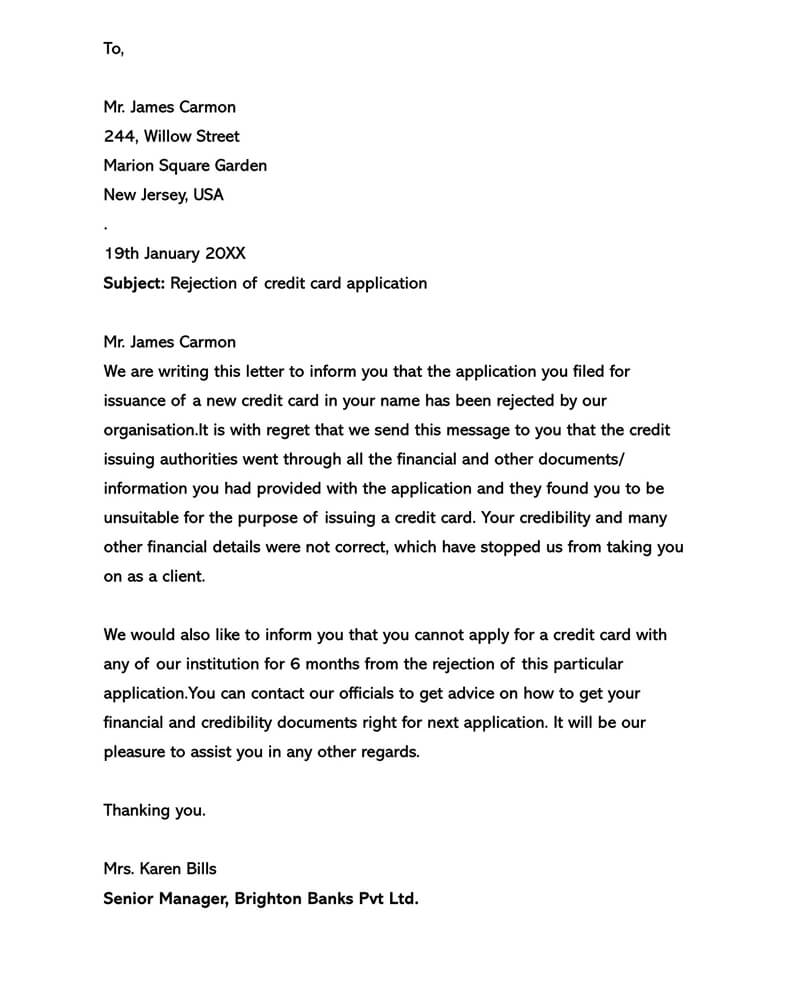
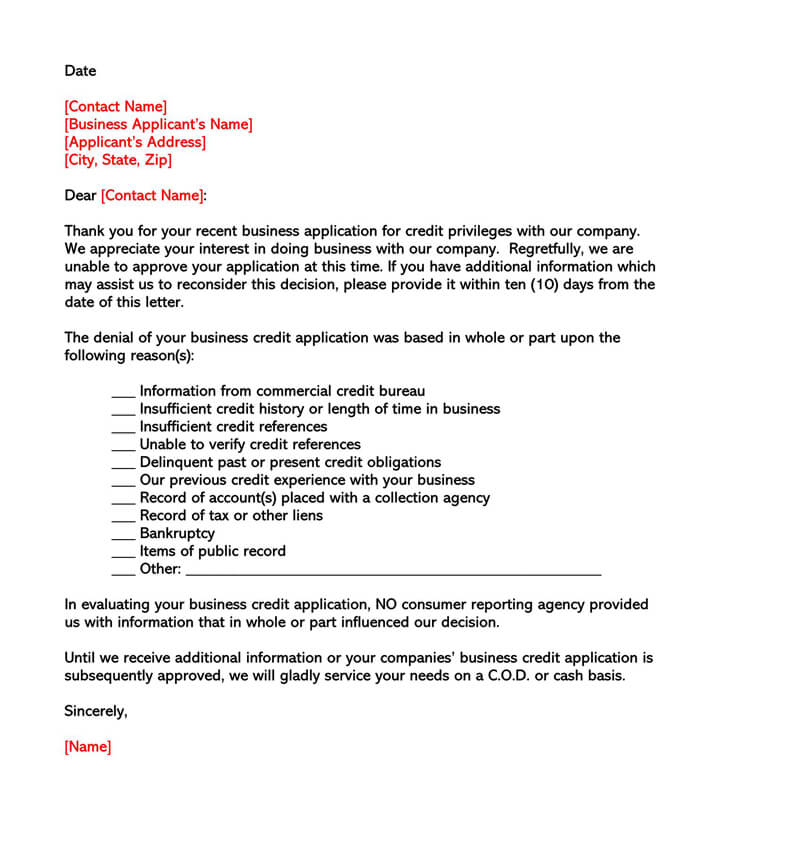

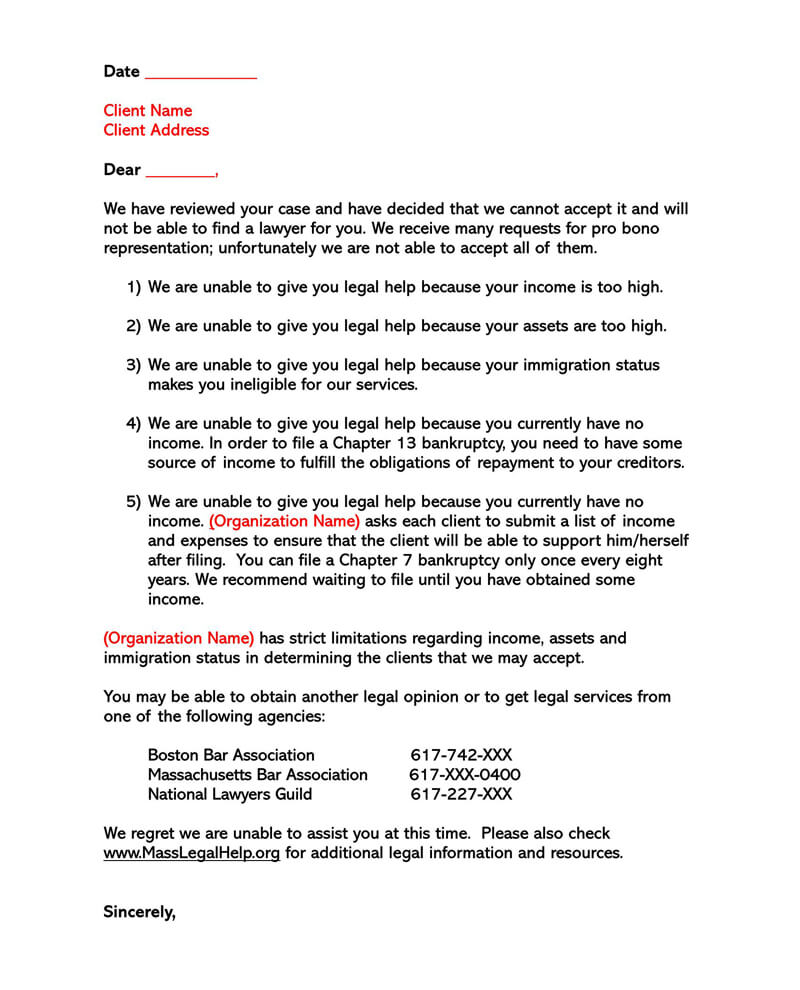
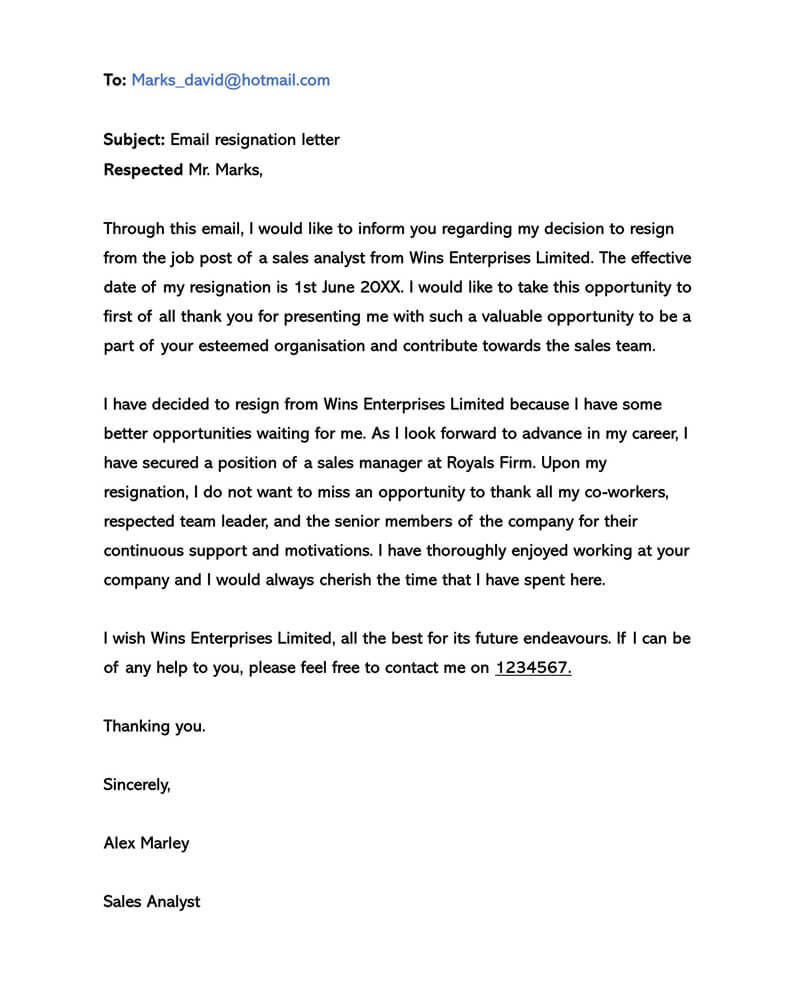
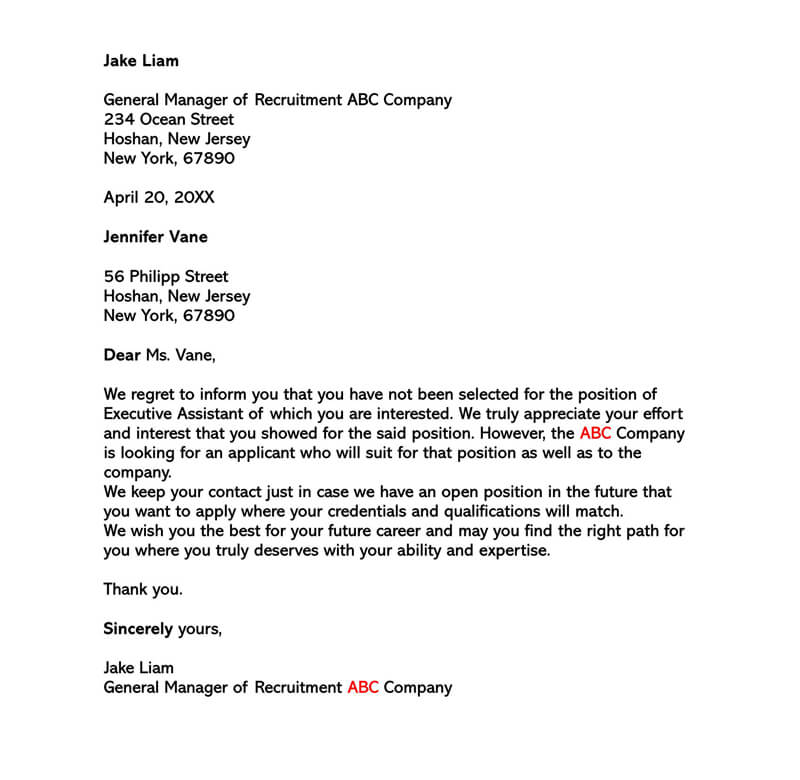
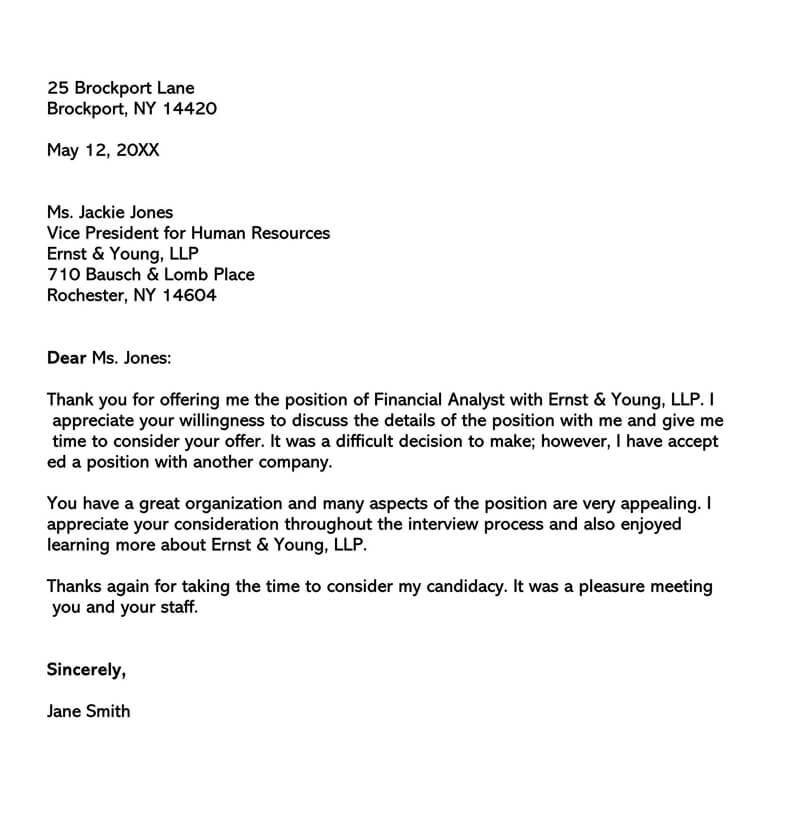
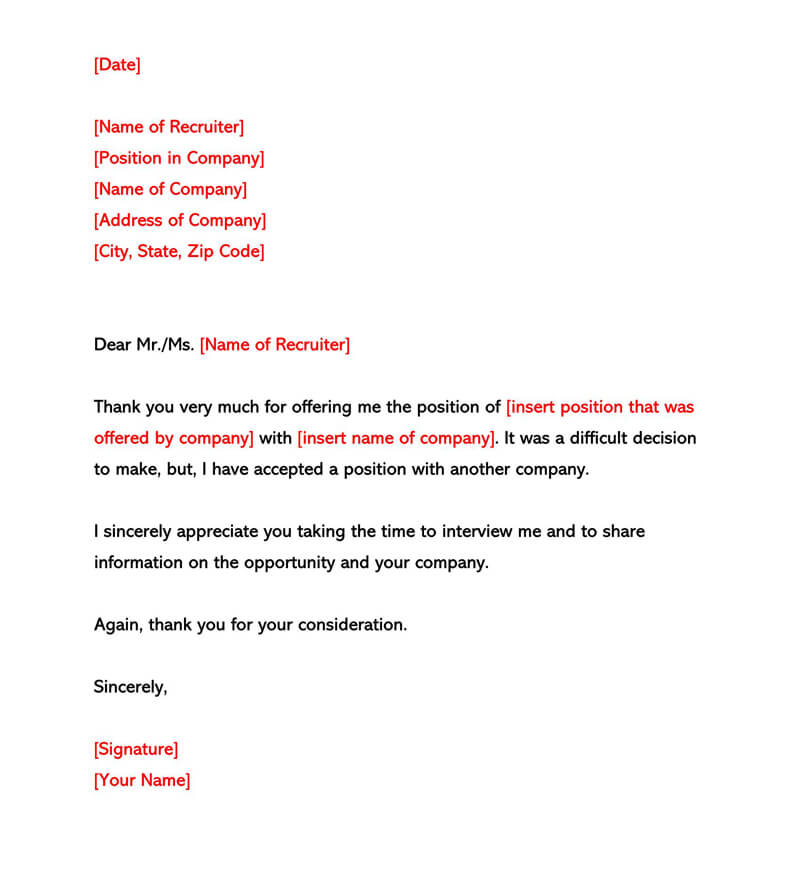
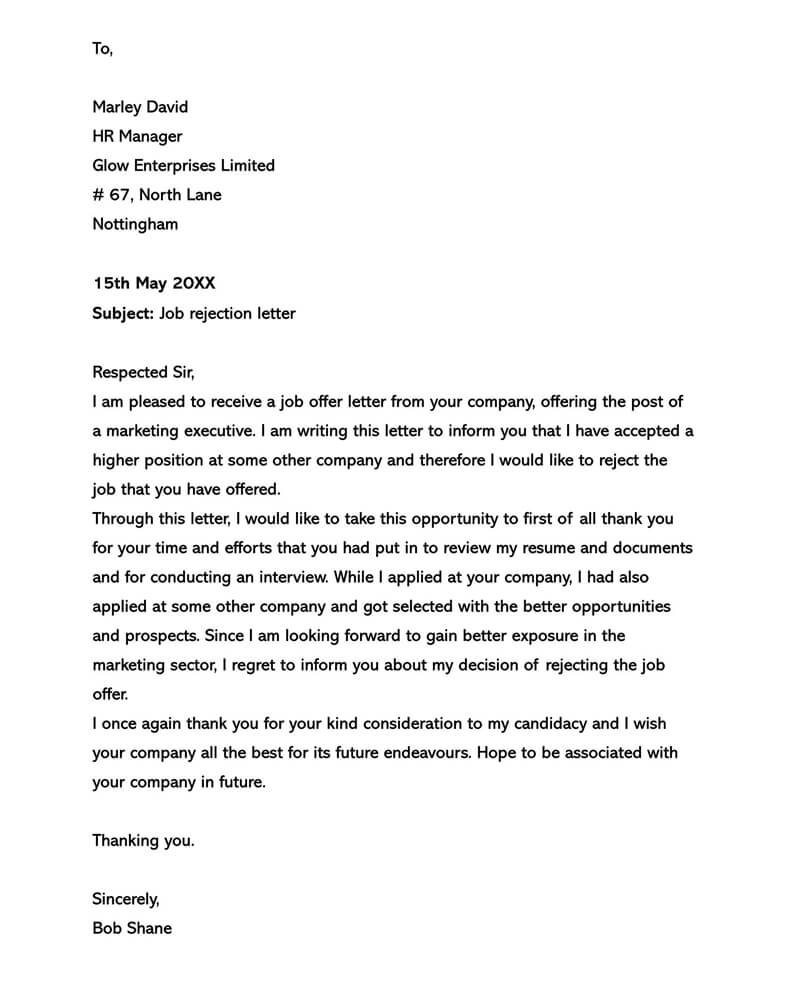
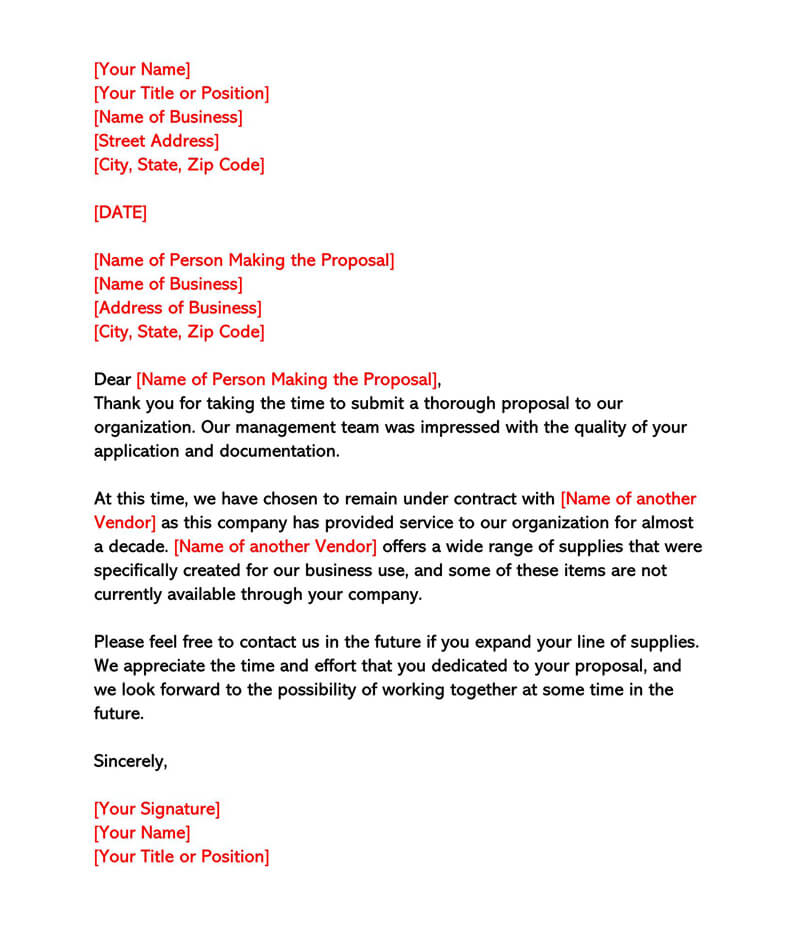
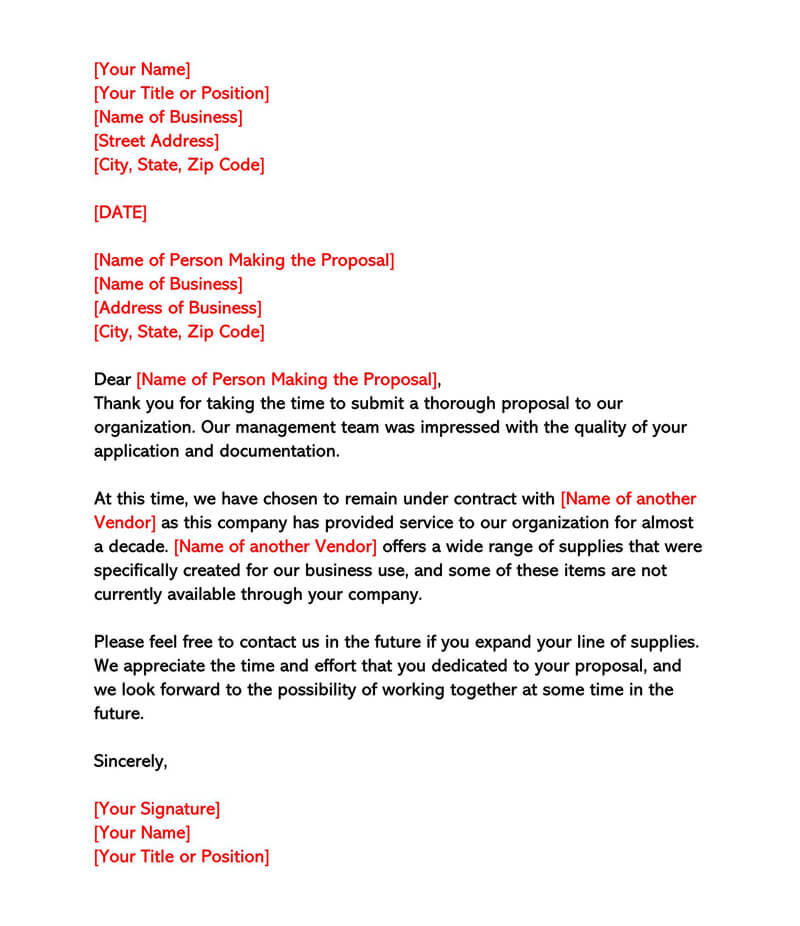
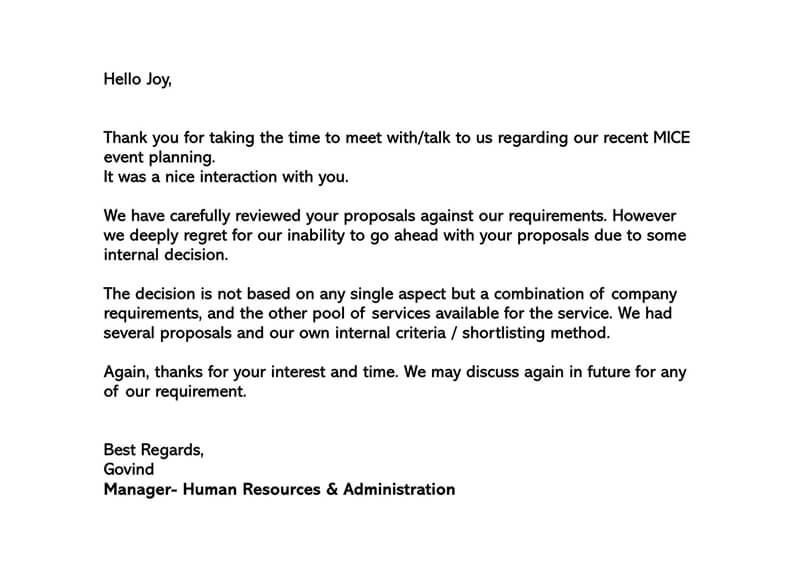
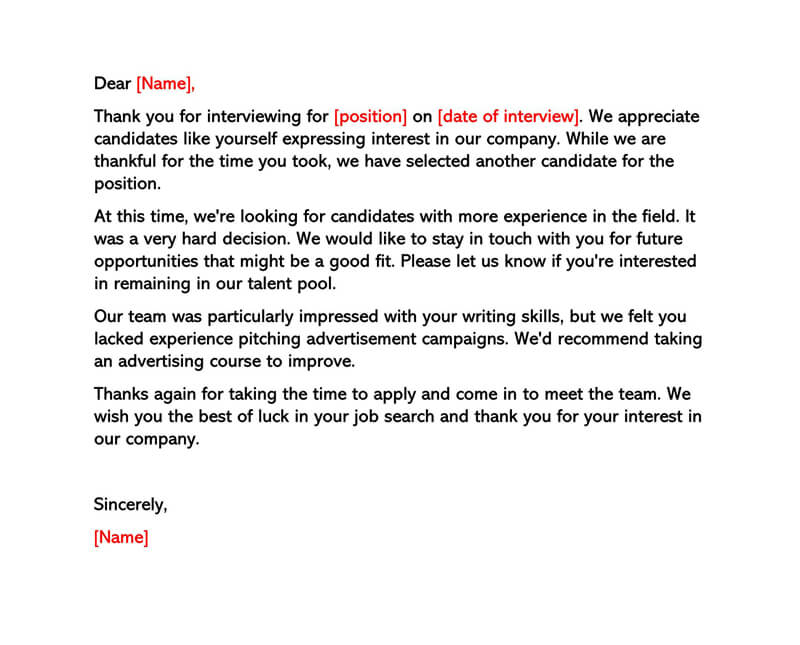
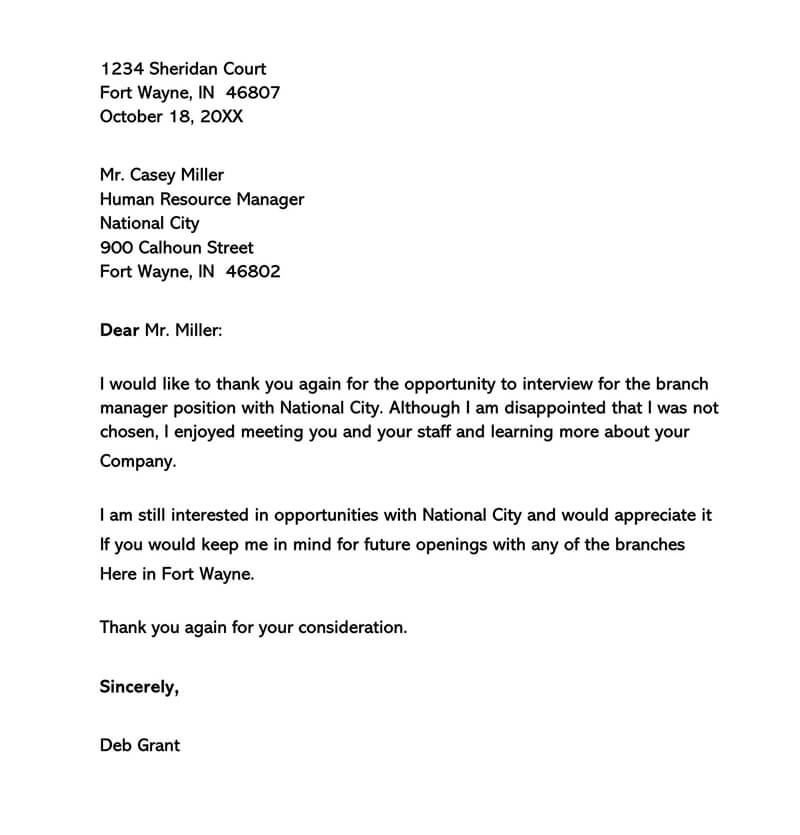
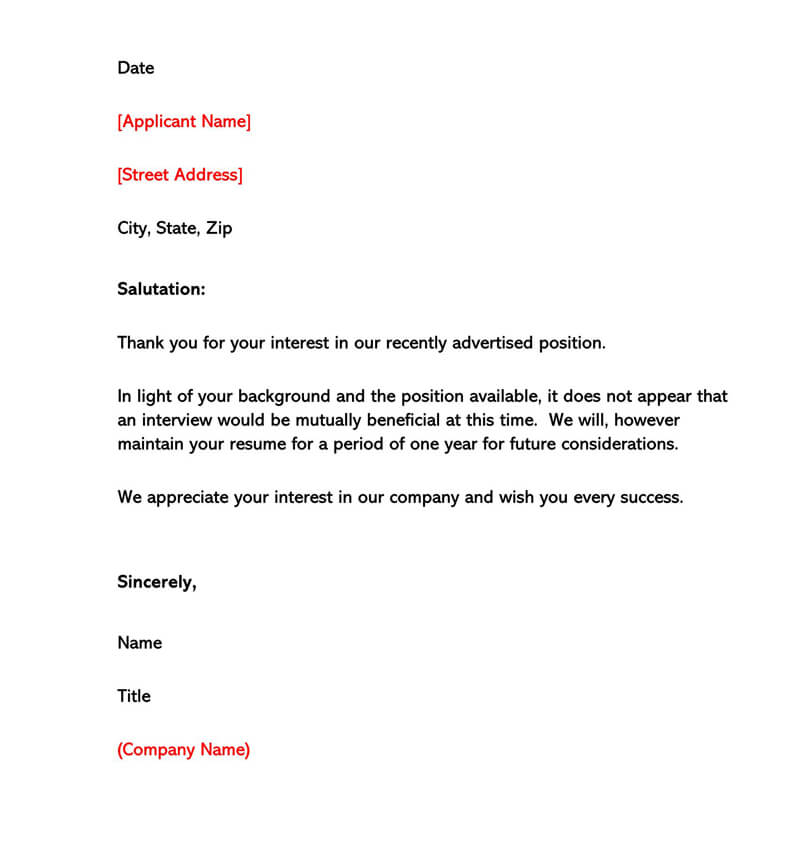

When Is It Appropriate to Reject?
Rejecting job applications can be due to a variety of reasons. The hiring committee will usually assess how different candidates perform based on their resumes and the interview. This article will look at when a job applicant can be disqualified.
Outdated job application
Adaptability has slowly but surely become a major consideration for companies, especially those who are heavily reliant on technology—most, if not all of them. With technology evolving fast, employers want applicants who are up-to-date. Therefore, applicants with CVs or resumes that are outdated can be rejected. Outdated job applications can be interpreted as a lack of up-to-date skills, or the applicant simply didn’t take time to prepare the application.
Poor skill assessment test results
Asking job applicants to carry out a skill assessment test can be a very effective way of sorting out candidates. The results of the assessment test are used as grounds for elimination. Candidates that do not meet the threshold are disqualified.
Poor soft skills evaluation
Soft skills include communication, social skills, teamwork, adaptability, problem-solving skills, etc. An applicant might be suitable based on his or her learned abilities (hard skills) but falls short of the basic soft skills necessary for the position, forming a basis for rejection.
Conflict of goals
Companies will always have long-term plans in place, and candidates whose career paths positively contribute to and align with the company’s goals are preferred. Candidates with conflicting goals can be turned down.
Politely Turning Down a Candidate
It can be uncomfortable to inform someone of their job application rejection, but it is often inevitable as a hiring manager (employer). Furthermore, it can be discouraging to the candidate, and therefore, rejecting the application ought to be done candidly and humanely as much as possible.
Below are things one should consider before and when writing the letter.
Choose the right time
Timing is very important when sending such letters. Once a candidate applies for a position, the waiting period is usually frustrating, and delayed responses mean they must endure the frustration for longer. As a result, letting the candidate know in time that they did not proceed to the next stage or get the job becomes a professional and courteous gesture. Timely job rejection letters can be sent via automated recruitment systems, where if an applicant does not qualify, they are notified immediately.
EXAMPLE
An automated email response system. Rejected candidates who are notified in a timely manner have been reported to be 52% more likely to continue and increase their relationship with the employer in question.
Appreciate the effort
When rejecting a candidate, always show appreciation for their effort in applying for the position. People always appreciate politeness, and this scenario is no different. A simple “thank you” can go a long way in leaving a positive attitude towards the company. Remember, candidates will always share their experiences with the company, either during conversations or on social media. Showing them appreciation will prevent a situation where people are skeptical about applying for jobs in the company due to what they heard or saw on social media, which might cost the company valuable potential employees.
NOTE
Do not settle when it comes to the selection of suitable employees.
Personalize it
It can be personalized to feel more personal. This is especially true for shortlisted applicants. Personalization involves referring to the applicant by their first name when addressing them. In addition, be sure to mention the job position they are applying for. Finally, within the letter, one can include a conversation or an outstanding observation made during the interview; this lets the candidate know that they were indeed being listened to.
Give feedback
As the hiring manager, making a professional recommendation or suggestion on where the applicant can make changes or improvements shows concern. Rejected candidates can implement the suggestions when applying for the next job.
Invite for future opportunities
Just because a candidate did not qualify for one position does not automatically disqualify them from other positions in the company. Therefore, it is important to encourage them to apply for other current or future open positions. However, this invitation does not have to be offered to candidates found to be unsuitable to work for the company.
Email, text messages, or voicemail job rejections are sent to applicants who do not qualify for an interview. Otherwise, for applicants the employer has had contact with, it is polite to first call them before following it up with the letter.
Benefits of a Rejection Letter
The hiring manager and the company they represent get to benefit from a job rejection letter in the following ways.
Good experience standard
Securing a job is often a significant step in people’s lives and careers. Candidates will undoubtedly keep in mind their experiences when applying for a job. Issuing the letter in a timely fashion ensures that they have a professional and polite experience with the employer or company. The letter also promotes healthy relationships with candidates.
NOTE
Maintaining and building relationships in the corporate sector is considered a healthy business practice.
Open option for future
Once the applicant receives the employer’s feedback through the letter, they can go and improve their skills and experience to the point that they become valuable to the employer in the future. Therefore, issuing the letter ensures there is malice between the employer and the candidate, ensuring that should a position in the company open up in the future, the candidate would not hesitate to apply. Employers should aim to keep their options open.
On the other hand, in a case where the letter was not issued, the candidate works on their weakness. They might refrain from applying for a job in the company; this can be a loss to the company, especially if they need a highly qualified employee.
Helps in employer branding
A company that issues such letters would enjoy good PR from applicants, even if they did not qualify for the position they were applying for. Applicants can refer to other people to apply for jobs in the company without fear of exposing them to the frustration of never getting a response from the employer.
On the other hand, if rejected candidates are not given the letter, they might share their application experience with family and friends, which might harm the employer’s/company’s reputation, which limits the number of people who will be applying for jobs, limiting the company’s choices when it comes to qualified candidates.
Job Rejection Letter Template
TEMPLATE
[Your Company Letterhead]
[Date]
[Candidate’s Name]
[Candidate’s Address]
[City, State, Zip Code]
Dear [Candidate’s Name],
I hope this letter finds you well. I would like to extend my sincere gratitude to you for taking the time to apply for the [Job Title] position at [Company Name] and for participating in our interview process.
After careful consideration, we regret to inform you that we have decided to move forward with another candidate for this position. This decision was not easy and was made based on a thorough evaluation of all applicants in the context of our current needs and requirements.
We were impressed by your skills, achievements, and professional background, and making this choice was challenging due to the high caliber of candidates like yourself. Please know that your application was reviewed carefully, and this decision does not diminish the value of your experience and qualifications.
We appreciate the effort and enthusiasm you have shown for joining our team and wish to encourage you to apply for future openings at [Company Name] that match your skills and experience. Your resume will be kept on file, and should a suitable position become available, we hope you will not hesitate to apply again.
Thank you again for your interest in [Company Name] and for the opportunity to learn about your qualifications. We wish you all the best in your job search and your future professional endeavors.
Should you have any questions or require feedback on your interview, please feel free to reach out to us. We are more than happy to provide guidance that may assist you in your career journey.
Warmest regards,
[Your Name]
[Your Job Title]
[Company Name]
[Contact Information]
Sample Letter of Rejection
Dear Alex Martinez,
Thank you for your interest in the Content Writer position with Zenith Digital Solutions and for the time and effort you dedicated to the interview process. We truly enjoyed discussing your approach to content creation and your vision for engaging audiences.
After a comprehensive review of several talented candidates, we regret to inform you that we have decided to proceed with another applicant whose experience aligns more closely with our current project needs. This was a difficult decision due to the high quality of your portfolio and the creativity you bring to your work.
We were particularly impressed by your knowledge of SEO strategies and your ability to craft compelling narratives. Your skills are undoubtedly valuable, and the decision was not a reflection of your capabilities but rather a matter of finding the match that best fits our immediate requirements.
While we won’t be moving forward with your application for this specific role, we recognize the potential in your work and would like to keep your resume on file for future opportunities. We are growing and anticipate new positions opening that could benefit from your expertise. We encourage you to apply again should a relevant position become available.
Thank you again for considering a career with Zenith Digital Solutions. We wish you the best in your ongoing job search and professional endeavors. If you have any questions or would like feedback on your application, please don’t hesitate to reach out. We are more than willing to share insights that may assist you in your career journey.
Best wishes,
Jordan Lee
Hiring Manager
Zenith Digital Solutions
jordan.lee@zenithsolutions.com
(555) 123-4567
Analysis
The rejection letter demonstrates professionalism and respect for the recipient by expressing gratitude for their interest in the position and acknowledging the effort they invested in the interview process. It begins with a courteous thank-you message, recognizing the applicant’s skills and contributions to the discussion during the interview. The letter maintains a tone of empathy and transparency throughout, clearly stating the decision to proceed with another candidate while also acknowledging the difficulty of making such a choice given the applicant’s strong portfolio and qualifications.
Furthermore, the letter emphasizes the value of the applicant’s skills and experience, reassuring them that the decision was not a reflection of their capabilities but rather a matter of finding the best fit for the immediate project needs. By expressing openness to considering the applicant for future opportunities and encouraging them to reapply, the letter demonstrates a commitment to maintaining a positive relationship with the candidate and leaves the door open for potential collaboration down the line. Overall, the letter effectively communicates the decision while leaving the applicant with a sense of respect, appreciation, and encouragement for their future endeavors.
Tips for the Rejection Letter
Every employer wants a job rejection letter that serves its intended purpose while demonstrating a certain level of professionalism.
Below are some things one should consider and/or incorporate when coming up with the letter.
- Don’t use the word ‘rejected’: As much as the letter is about “rejection,” it should not be used in the letter. Instead, opt for words or phrases that convey the same meaning.
EXAMPLE
“The hiring committee, through a unanimous vote, decided not to accept your application for the reasons stated below.” Keeping the letter positive should be the objective of whoever is writing it.
- Keep it brief: It should be kept as short as possible. Reading a lengthy letter might be frustrating to the candidate. Keeping it short ensures they go through the letter entirely.
NOTE
Keeping the letter short is not an excuse for not being polite or including a thank you and a feedback statement.
- Be honest: Information given in the letter should be true to the facts. The actual reason(s) why they were rejected must be clearly outlined in a polite manner.
EXAMPLE
Avoid promising to reach out to the candidate if there is no intention of making this possible. False promises raise expectations and might hinder the candidate from looking for other opportunities elsewhere.
NOTE
Do not refrain from stating facts while trying to remain polite and vice versa.
- Give constructive feedback: Be sure to include constructive feedback in the letter. Identify specific issues and concerns and provide solutions to areas of weakness where the candidate can improve. An employer’s feedback should be guided by positive intentions.
EXAMPLE
Stating, “Take a business administration class to attain the bare minimum requirements for a managerial position.
- Avoid words that can be translated as evidence of unlawful discrimination: Reasons specified in the letter for rejecting the applicant should be solely based on their qualifications and not any other physical aspects or any disability. Also, avoid comparing candidates by declaring one to be more qualified than the other; it might be termed unlawful discrimination.
- Ask for feedback on the recruitment process: Employers should also ask for ways to improve their recruitment process. Of course, no process is ideal, and there will always be room for improvement. Candidates might be better positioned to see the flaws in the process than the employer.
Conclusion
Sending a job rejection letter is vital to maintaining professional relationships between job applicants and employers. Even though the process of writing the letter might seem unnecessary, employers should take their time to write one for candidates who did not qualify for the position. The letters should be kept short, honest, and polite. They should be personalized to show the employer appreciates the effort to apply for the position. Feedback should be given in the letter to guide the candidate on the qualities and skills they need to improve.

